Venezuela Crypto Sanctions Evasion Checker
Transaction Analysis Tool
Enter details of a crypto transaction to check if it shows potential indicators of Venezuela sanctions evasion.
Analysis Results
TL;DR
- Venezuela created the state‑run PETRO token to sidestep U.S. and EU sanctions.
- Government‑controlled exchanges like Criptolago funnel oil revenue into stablecoins such as USDT.
- PDVSA uses crypto to move oil‑derived wealth through ship‑to‑ship trades and OTC brokers.
- Compliance teams watch for red‑flags: Venezuelan exchange IDs, sudden USDT spikes, and oil‑linked wallet activity.
- Future evasion may shift toward privacy coins and DeFi protocols as enforcement tightens.
Venezuelan Crypto Strategy: From Hyperinflation to Sanctions Evasion
When inflation hit triple‑digit levels, the Maduro regime turned to digital money not just to preserve citizens' savings but to create a Venezuela cryptocurrency sanctions loophole. The move was public: President Nicolás Maduro told the world that the new token would help the country “bypass the illegal financial embargo imposed by the United States.” The result was a full‑scale, state‑sponsored crypto ecosystem that blends national policy with criminal‑grade money‑laundering techniques.
Petro: The First Government‑Issued National Cryptocurrency
PETRO is a Venezuelan state‑issued cryptocurrency launched in 2018 and backed by proved oil reserves. Unlike Bitcoin, PETRO’s value is tied to barrels of oil, natural gas, or gold, which the government claims stabilizes the token against inflation. In practice, PETRO serves two overlapping goals:
- Economic relief: Offer a digital store of value when the bolívar collapses.
- Sanctions work‑around: Provide a channel for oil revenue that can be converted into an internationally tradable asset without touching the traditional banking system.
The token’s distribution is handled through seven state‑approved exchanges. One of the most visible is Criptolago, owned by Zulia’s regional government.
Criptolago is a government‑run cryptocurrency exchange in Venezuela’s Zulia state, overseen by Governor Omar Prieto. Prieto himself sits on the U.S. sanctions list, underscoring how the exchange is a direct conduit for sanctioned officials to receive crypto payments.
Stablecoins and the Oil‑to‑Crypto Pipeline
The most active crypto in Venezuela’s evasion network is the dollar‑pegged stablecoin Tether (USDT). Stablecoins let the regime move large sums without worrying about price swings, which is crucial when converting oil sales into cash.
USDT is a stablecoin that maintains a 1:1 peg to the US dollar, widely used for low‑volatility transactions. PDVSA, the state oil company, trades oil directly for USDT on offshore platforms, then funnels the tokens through Venezuelan OTC brokers to local wallets.
Technical steps typically look like this:
- Oil is loaded onto a vessel in international waters to avoid port inspections.
- The ship’s captain receives a wallet address from a PDVSA‑controlled crypto aggregator.
- Payment is made in USDT, recorded on a public ledger but anonymized through mixers.
- Funds are transferred to Venezuelan OTC brokers, who exchange the tokens for bolívar or cash.
This workflow bypasses correspondent banks entirely, delivering value directly to sanctioned entities.
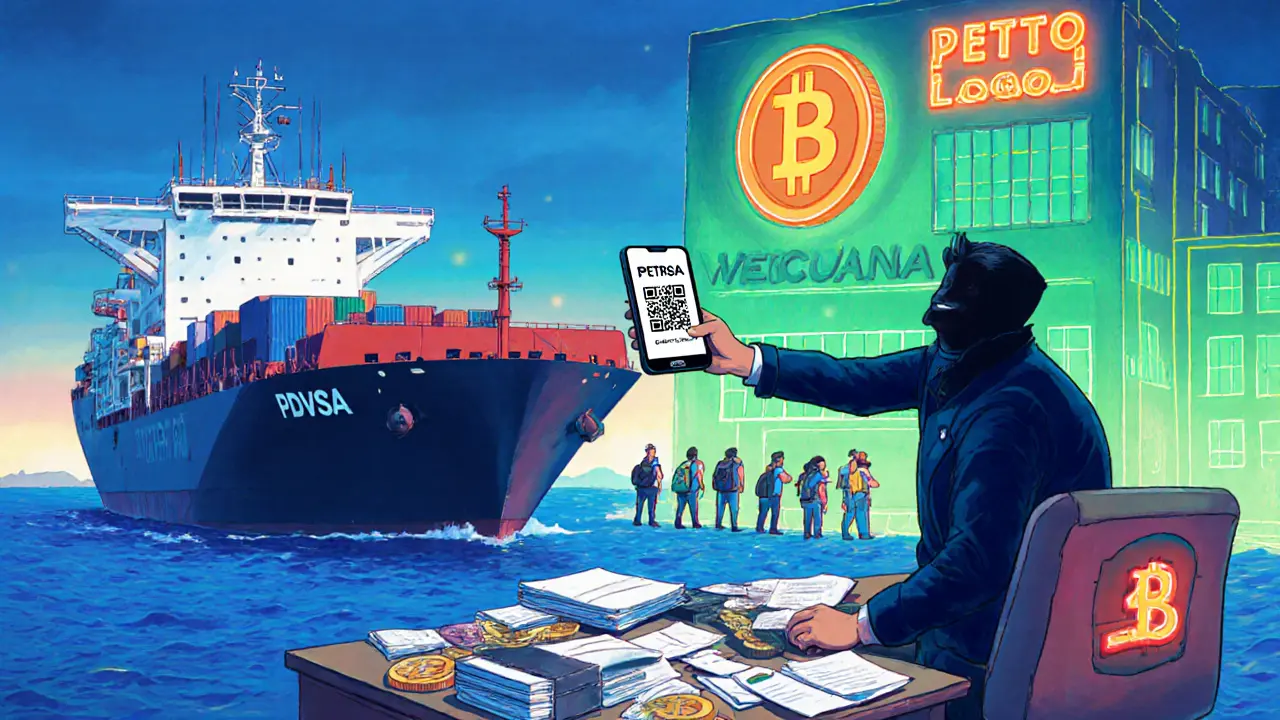
Compliance Challenges: Red Flags and Detection Strategies
Financial institutions face a steep learning curve when trying to spot Venezuelan crypto evasion. The most common warning signs, distilled from DOJ indictments and Chainalysis reports, include:
- Incoming or outgoing USDT transactions linked to wallet clusters labelled “PDVSA” or “Petro Exchange”.
- Large, rapid USDT bursts from previously dormant Venezuelan addresses.
- Use of OTC brokers located in Caracas that lack AML/KYC documentation.
- Ship‑to‑ship oil trades that reference crypto payment language in cargo manifests.
Effective detection relies on blockchain analytics tools that can map wallet ownership, monitor transaction velocity, and cross‑reference with sanctions lists maintained by OFAC.
OFAC is the U.S. Office of Foreign Assets Control, which administers and enforces economic and trade sanctions. OFAC’s recent updates specifically flag PETRO‑related wallets as “Specially Designated Nationals,” meaning any transaction with those addresses triggers a compliance alert.
Comparative Perspective: Venezuela vs. Other Sanctioned Nations
While Russia, Iran, and North Korea have dabbled in crypto, none have built a national token backed by a natural resource the way Venezuela did. The table below highlights key differences.
| Entity | Backing | Control | Main Use | Typical Users |
|---|---|---|---|---|
| PETRO | Oil reserves, gold, gas | Venezuelan government & state‑run exchanges | Oil revenue conversion, sanction circumvention | Government officials, PDVSA, sanctioned elites |
| Bitcoin (BTC) | Decentralized proof‑of‑work | None (open network) | Store of value, peer‑to‑peer transfers | General public, illicit actors |
| USDT (Tether) | US dollar peg | Private company (Tether Ltd.) | Low‑volatility payments, liquidity provision | Traders, PDVSA, OTC brokers |
| Ruble‑linked token (Russia) | Russian Ruble | State‑aligned developers | Domestic payments, limited export | Russian banks, approved firms |
| Iranian “IRRcoin” proposals | Iranian rial | Government‑backed pilots | Domestic trade, sanctions avoidance (pilot) | State enterprises, NGOs |
Venezuela’s model is unique because it integrates a national token, state‑run exchanges, and stablecoin pipelines into a single, government‑directed system. Other regimes rely more on ad‑hoc crypto use or private actors.
Future Outlook: Privacy Coins, DeFi, and Enforcement
U.S. Treasury and OFAC have stepped up blockchain‑analysis capabilities, but the Venezuelan network is already eyeing next‑generation tools. Analysts predict three likely shifts:
- Privacy‑focused coins: Tokens like Monero or Zcash could replace USDT for higher anonymity.
- Decentralized finance (DeFi) bridges: Smart‑contract liquidity pools allow token swaps without a centralized exchange, making sanctions‑list checks harder.
- Layer‑2 scaling: Faster, cheaper transaction layers (e.g., Polygon) reduce the cost of moving large oil‑derived sums.
Each development raises new compliance challenges. Institutions will need to adopt on‑chain forensic tools that can trace privacy‑coin mixers and DeFi routing paths. The cat‑and‑mouse game will intensify as enforcement agencies publish more granular watchlists.
Practical Checklist for Compliance Teams
Use the following quick‑reference list when reviewing crypto activity that could involve Venezuela:
- Verify counterparties against OFAC’s “Venezuela‑related” designations.
- Screen wallet addresses for known PETRO exchange clusters (e.g., Criptolago).
- Monitor USDT transaction spikes linked to the “PDVSA” tag in blockchain analytics platforms.
- Require enhanced due‑diligence for any OTC broker located in Caracas.
- Implement transaction‑size thresholds (e.g., flag USDT transfers > $50,000 from Venezuelan sources).
- Keep abreast of new sanctions updates-OFAC often adds crypto‑related entities after high‑profile indictments.
Following this list helps reduce false positives while catching the high‑risk flows that regulators target.
Frequently Asked Questions
Why did Venezuela create its own cryptocurrency?
The government needed a digital asset that could bypass banking restrictions, preserve oil revenue, and offer a hedge against hyperinflation. PETRO’s oil‑backed design gave it a tangible claim to value while letting the regime move money outside the traditional financial system.
How does PDVSA use stablecoins like USDT?
PDVSA sells oil on the high seas, receives payment in USDT, and then routes the tokens through Venezuelan OTC brokers. The stablecoin’s dollar peg lets the company avoid the volatility of other crypto while staying off the sanctions‑blocked banking network.
What are the main red flags for sanctions‑evasion in crypto?
Typical signals include large USDT spikes from Venezuelan wallets, transactions involving PETRO‑exchange addresses, and rapid transfers through unregistered OTC brokers. Matching these patterns against OFAC’s watchlists is a key compliance step.
Can ordinary Venezuelans use crypto without breaking sanctions?
Yes, many citizens hold Bitcoin or USDT to protect their savings from hyperinflation. The problem arises when they trade with sanctioned entities or use state‑controlled exchanges that are themselves targeted by sanctions.
What might Venezuela switch to as enforcement tightens?
Experts expect a move toward privacy‑focused coins, DeFi swapping protocols, and layer‑2 networks that make tracing harder. These tools can preserve anonymity while still allowing the regime to move oil‑derived wealth.






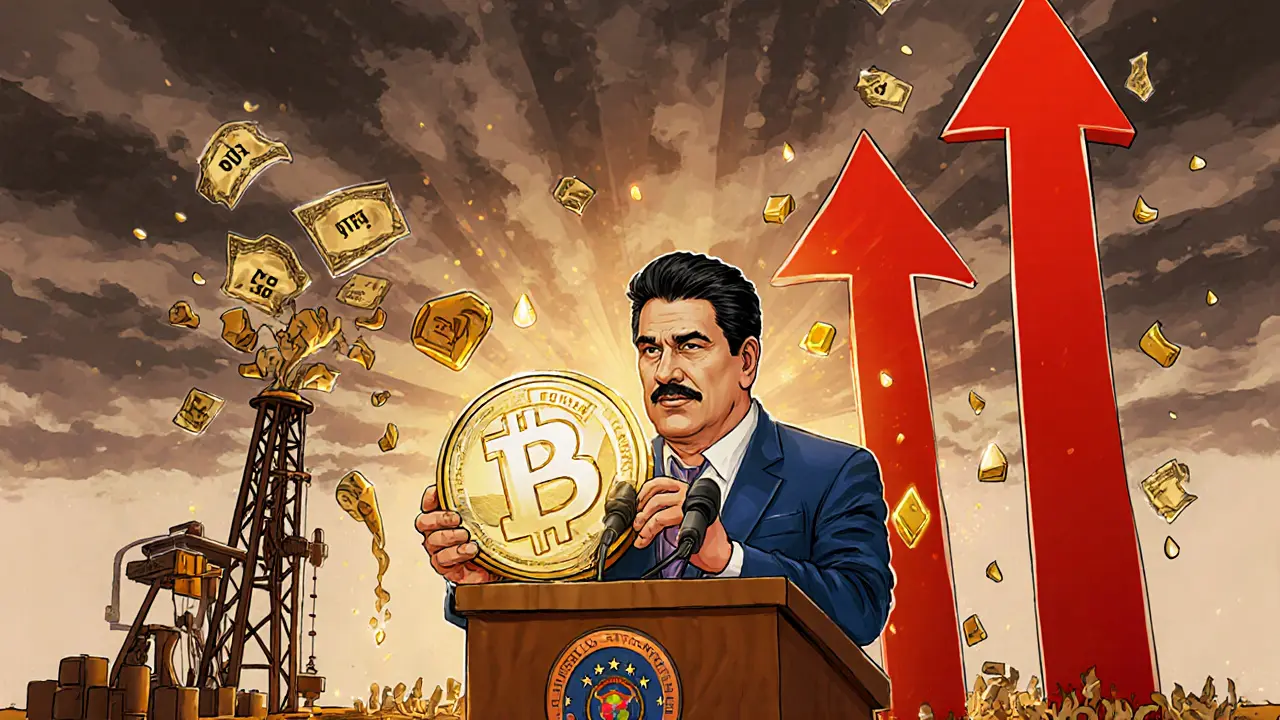
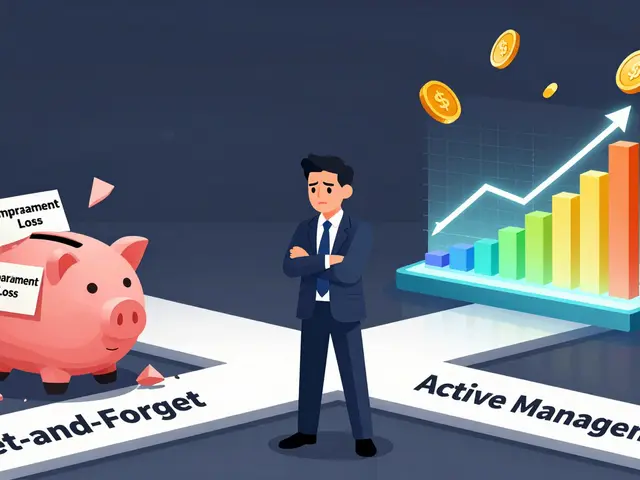
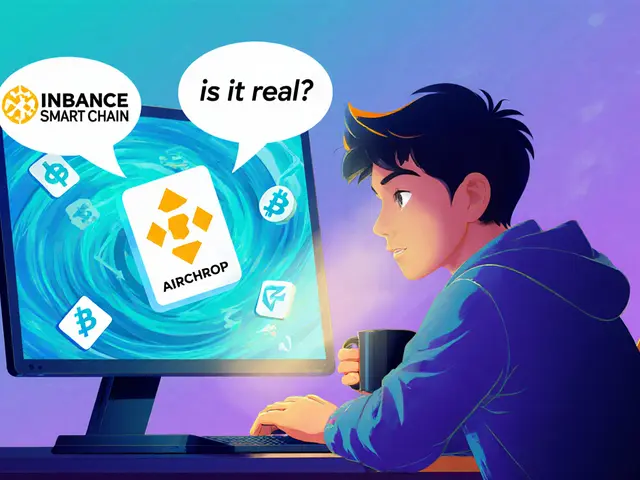
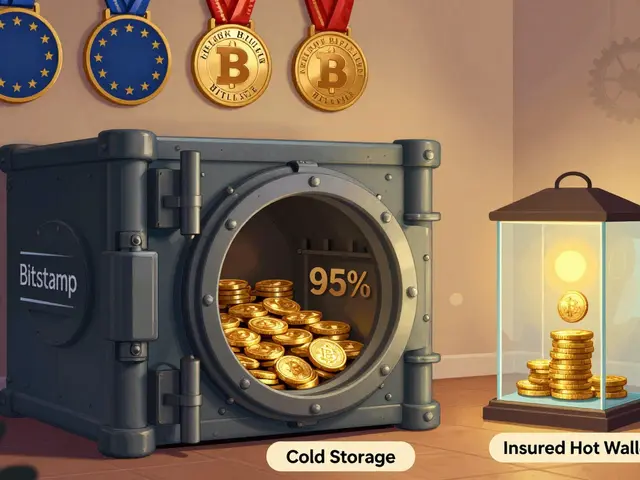
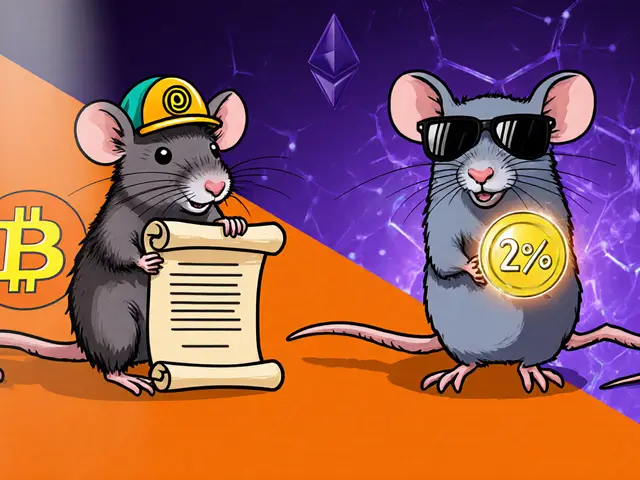
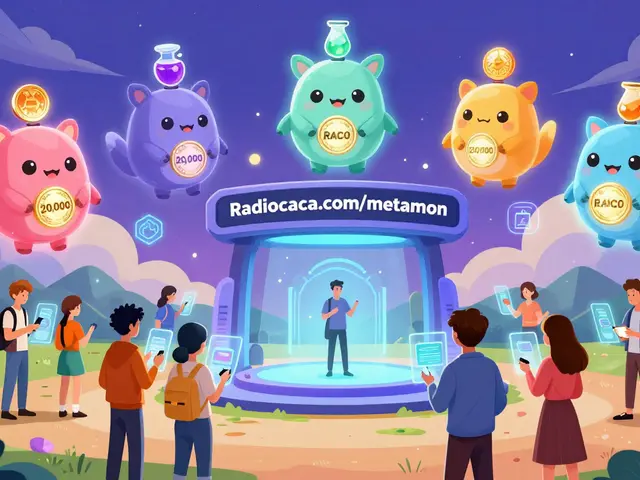
People Comments
Alright, strap in – the Venezuelan crypto playbook reads like a thriller script! 😱 The government birthed PETRO, a token tied to oil reserves, to sidestep the U.S. embargo, then married it to state‑run exchanges like Criptolago. From there, they funnel oil‑derived cash into stablecoins such as USDT, which can be moved instantly across borders without touching a traditional bank. PDVSA, the national oil giant, ships oil in international waters, gets paid in USDT, and hands the tokens off to offshore OTC brokers, who in turn dump them for bolívars or cash. The whole pipeline is a clever loophole that keeps sanctions at arm’s length while still cashing in on oil revenues. For compliance teams, the red flags are clear: Venezuelan wallet clusters, sudden USDT spikes > $50k, and any mention of PETRO‑exchange addresses on the blockchain. Stay sharp, monitor mixers, and cross‑reference every address with the latest OFAC list. 🚀
What we’re seeing here is a blatant affront to American resolve – Venezuela is literally building a digital cash‑cow to dodge the sanctions we’ve hammered down. The PETRO token isn’t some innocent experiment; it’s a state‑sponsored lifeline for oil money, pumped through shadowy exchanges and USDT tunnels. The U.S. must double down on enforcement, crank up blockchain surveillance, and clamp down on any OTC broker that even whispers "Venezuela" in a transaction memo. Patriotism means protecting our financial system from these rogue regimes, and we can’t let a handful of tokens erode the pressure we’ve built.
Honestly, the whole narrative feels like a recycled conspiracy theory for anyone who still believes crypto is a magical money‑laundering wand. Yes, Venezuela dabbles in PETRO and USDT, but the scale is minuscule compared to global illicit flows. Most of these so‑called "sanctions‑evasion pipelines" are just small‑scale ops that get blown out of proportion by pundits seeking drama. Regulators should focus on real high‑value targets instead of chasing every obscure wallet address that mentions Caracas. This post overstates the threat and fuels unnecessary paranoia.
Great rundown! It’s encouraging to see how compliance teams can actually turn these red‑flag patterns into actionable intelligence. By flagging USDT spikes and PETRO‑exchange clusters early, banks can stay ahead of the curve and protect themselves from inadvertent sanctions breaches. Remember, a proactive stance not only safeguards the institution but also reinforces the broader fight against illicit finance. Keep the momentum going – every vigilant watch‑list update makes a difference.
Fascinating how a nation can weave a whole crypto ecosystem around its natural resources, isn’t it? 🎨 From PETRO’s oil‑backed promise to the USDT pipelines that move oil proceeds, it’s a blend of state policy and tech‑savvy workarounds. For anyone studying the cultural impact of sanctions, this case shows how crypto becomes both a shield and a symbol of resilience. Keep an eye on the emerging privacy‑coin shift – it could rewrite the playbook entirely.
Wow, who knew crypto could be such a geopolitical tool? Crazy stuff.
Imagine the kaleidoscopic dance of oil, tokens, and offshore brokers – it’s like watching a neon‑lit tango on the blockchain! 🌈 The PETRO token, backed by slick barrels of crude, gives the regime a glittering lifeline, while USDT acts as the smooth ballroom floor for massive transfers. What’s truly dazzling is the way these digital currents slip through regulatory nets, painting the financial world in bold, rebellious hues. For compliance wizards, it’s a call to paint brighter, sharper detection brushes – let’s splash those red‑flag colors across every suspicious ledger entry!
Listen up – this whole PETRO thing is just another gimmick to keep their regime afloat while the rest of the world moves on. If you’re not baffled by the sheer audacity of trying to legitimize a state‑run token, you’re not paying attention. Cut the hype and focus on the real issue: they’re using crypto to keep sanctions at bay, and that’s a problem that needs a hard‑line response, not a vague "watch the wallets" approach.
Honestly, I think we’re making a mountain out of a molehill. Sure, Venezuela dabbles in crypto, but it’s hardly a game‑changing threat. Most of these transactions are tiny, and the global financial system can absorb a few extra USDT moves without breaking a sweat. Let’s keep perspective and not overreact to every little crypto experiment they try.
Crypto just makes sanctions look silly.
Hey team, this deep dive is a solid reminder that even in a chill observer mode, we can spot the patterns that matter. The blend of PETRO, USDT, and offshore OTC brokers is a classic case of “hide the money, keep the flow.” Let’s keep the energy up, share these insights with our peers, and push for smarter monitoring tools that can flag those big‑ticket USDT bursts before they slip through.
When one peers beneath the glittering veneer of state‑issued tokens, a profound philosophical conundrum emerges: what is the nature of value when it is simultaneously a conduit for legitimate economic activity and a shield against internationally mandated restraints? The PETRO token, ostensibly anchored to tangible oil reserves, invites us to contemplate whether the underlying commodity imparts any intrinsic worth, or whether the token’s value resides solely in the collective belief of a sanctioned regime’s authority. Moreover, the deployment of stablecoins such as USDT as a transactional medium foregrounds a paradox – stability is engineered through fiat backing, yet the stability is leveraged to undermine fiat‑based sanctions. The iterative process of ship‑to‑ship exchanges, covert wallet transfers, and the utilization of mixers creates a labyrinthine topology on the blockchain, one that challenges traditional notions of traceability and accountability. In this labyrinth, each node-a wallet address, an OTC broker, a governmental exchange-functions as both a participant in and a symptom of a larger systemic adaptation, recalibrating to the pressures of geopolitical enforcement. Consequently, compliance officers are tasked not merely with ticking boxes against OFAC lists, but with navigating an evolving epistemology of risk, wherein the epistemic frames shift as new privacy‑preserving technologies emerge. The future trajectory, perhaps, will be dictated not by policy alone but by the ontological redefinition of money itself: as a mutable, code‑driven entity capable of transcending borders, yet perpetually subject to the moral calculus of its creators. Thus, the Venezuelan case is not an isolated anecdote but a microcosm of a broader metamorphosis in the global financial order, demanding a re‑examination of legal, ethical, and philosophical foundations that have long undergirded our economic interactions.
While the preceding exposition is indeed verbose, it fails to address the pragmatic core of the matter: this so‑called "crypto shield" is, in reality, a superficial veneer that merely postpones inevitable detection. The deployment of PETRO and USDT does not confer any substantive advantage; rather, it expands the attack surface, inviting more rigorous forensic scrutiny. In essence, the narrative that Venezuela has outsmarted sanctions through blockchain is overstated; the sophisticated analytics employed by enforcement agencies will inevitably unravel these superficial layers. Hence, the argument that privacy coins will render compliance impossible is, at best, an exaggerated speculation lacking empirical support.